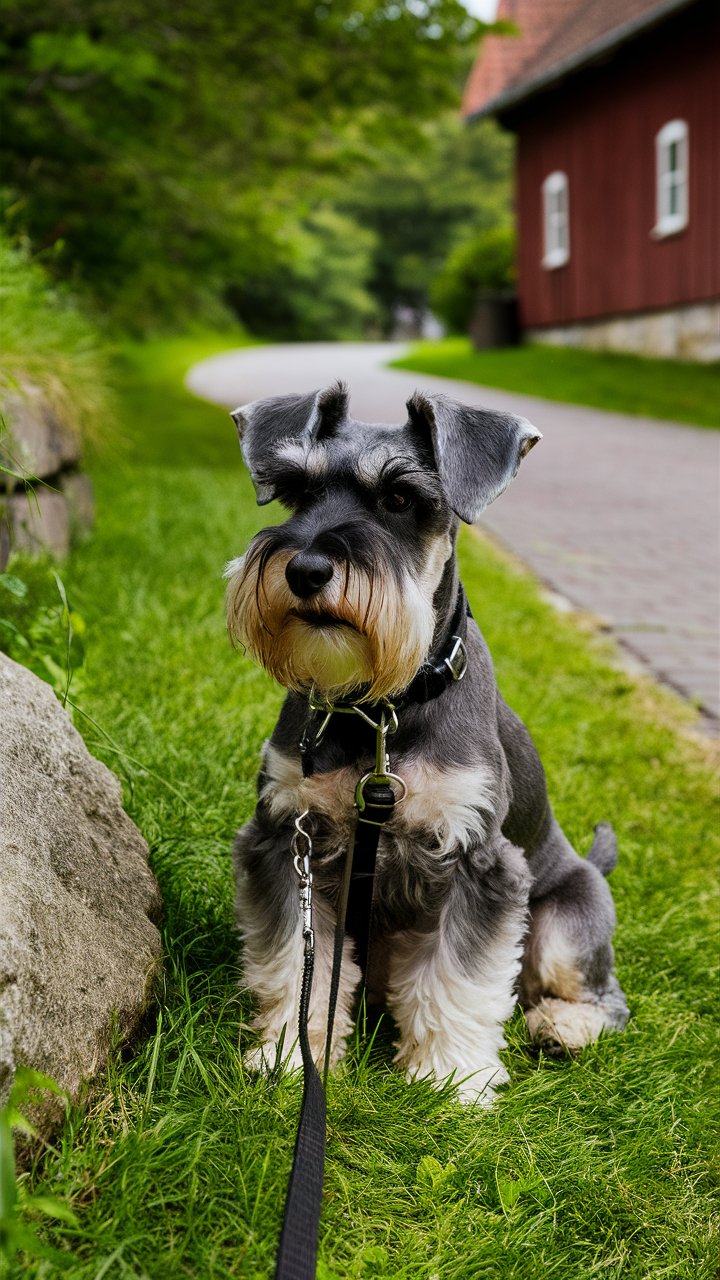Quick Summary:
Your Schnauzer’s grunts and groans can reveal more than just funny noises — they’re emotional and physical signals. From seeking attention to expressing discomfort or even underlying health issues, understanding these sounds helps you become a more mindful Schnauzer parent.
🐾 Why Do Schnauzers Grunt?
Grunting and groaning are natural vocalizations many Schnauzers use to express themselves. Unlike barking, which is more attention-grabbing, grunts are softer sounds linked to comfort, mood, and body language.
However, sometimes these sounds indicate pain, frustration, or medical concerns, so understanding when and why they happen is crucial.
🔍 Top 9 Reasons Why Your Schnauzer Grunts & Groans
1️⃣ They Want Your Attention (Learned Behavior)
Schnauzers are intelligent and emotionally tuned to you. If you’ve ever rewarded their grunt with petting, cuddles, or eye contact — congrats, you’ve taught them grunting gets attention.
💡 Expert Tip: Ignore attention-seeking grunts for a few seconds, then reward silence. This reverses the pattern gently.
2️⃣ Dreaming (REM Sleep Activity)
Schnauzers experience REM sleep, just like humans. Grunting or twitching during sleep may simply be dream activity — perhaps chasing a ball or recalling a fun walk.
🩺 Vet Insight:
As long as they’re relaxed (no trembling, teeth chattering, or labored breathing), these grunts are harmless and even healthy!
3️⃣ Expressing Enjoyment
When you scratch their belly or give treats, some Schnauzers “grunt” with pleasure. It’s a low, relaxed sound — a canine version of “Ahhh, that’s nice!”
🎯 Pro Tip: These positive grunts happen when they’re content, not anxious — always note context.
4️⃣ Emotional Expression (Highly Expressive Personality)
Miniature Schnauzers, especially, are emotionally vocal dogs. If yours grunts when lying down, eating, or relaxing — it’s likely just their way of “talking.”
🧠 Behavior Fact: This breed ranks high in emotional expressiveness, using sound and posture to communicate.
5️⃣ Overweight or Obesity-Related Strain 🧍♂️
Extra pounds make breathing harder and joints stiffer. Overweight Schnauzers grunt more often due to restricted airflow or movement strain.
📊 Quick Check:
If you can’t easily feel their ribs or see a waist tuck, your dog might be overweight.
🩺 Vet Suggestion:
A healthy Schnauzer’s belly should tuck upward behind the rib cage — if it sags, discuss a diet plan with your vet.
6️⃣ Growing Pains (Puppy Phase)
Young Schnauzers in growth spurts may grunt when lying down. This isn’t serious — it’s muscle soreness or bone development discomfort.
💡 What To Do:
Offer joint-supporting nutrients (Omega-3s, Glucosamine) and ensure soft bedding.
7️⃣ Disappointment or Frustration 😞
You said “Walk!” then sat down? Expect a grunt of protest. Schnauzers, being sharp thinkers, show emotional letdown vocally.
🐾 Training Tip:
Avoid using trigger words unless you mean it. It builds trust and avoids frustration grunts.
8️⃣ Pain or Illness ⚠️
Persistent grunting during movement, rest, or after exercise may signal pain, arthritis, or internal discomfort.
🩺 Signs To Watch For:
- Reluctance to jump or climb
- Whimpering with grunts
- Appetite loss or hiding behavior
If you see these, schedule a vet checkup immediately. Don’t guess — early detection saves lives.
9️⃣ Sadness or Canine Depression 😔
Schnauzers form deep emotional bonds. Grunting, sighing, or groaning, especially after a loss (pet or human), may indicate sadness.
🧠 Mental Health Tip:
Increase playtime, walks, and mental stimulation. In serious cases, vet-recommended mood support or even a new furry friend can help.
🧭 3 Expert Tips To Manage Grunting & Groaning
✅ 1) Manage Their Weight
Healthy weight = Healthy joints + Better breathing.
🧮 Calorie Formula:
(Ideal weight in kg × 30) + 70 = Daily calories
Gradual adjustments (5–10% reduction per month) work best. Pair with daily walks and puzzle feeders for stimulation.
✅ 2) Avoid Reinforcing Unwanted Grunts
Every time you pet or talk when they grunt for attention, you’re teaching them it works.
⚡ Try This: Wait 3–5 seconds after a grunt before giving affection — reward calm, quiet behavior instead.
✅ 3) Consult a Vet When Unsure
If grunting seems frequent, strained, or painful, rule out:
- Respiratory infections
- Joint pain
- Digestive issues
- Heart problems
A professional checkup provides peace of mind and a clear action plan.
🎁 Bonus: Get Them a Playmate 🐕🤝🐕
Schnauzers crave companionship. If boredom or loneliness is behind their groans, another pup can bring joy — just ensure you can handle double the walks, food, and love!
🧠 Pro Insights: Common Weak Points Owners Miss
✔ Many owners confuse contentment grunts with pain signals
✔ Ignoring weight-related issues — big mistake for this breed
✔ Rewarding attention grunts unknowingly
✔ Missing emotional cues — Schnauzers are highly sentient
🙋♀️ FAQs
Q: Is it normal for Schnauzers to grunt daily?
➡️ Yes, as long as it’s context-based (relaxation, stretching, etc.) and not linked to pain or distress.
Q: Can grunting mean breathing issues?
➡️ Possibly. If you hear wheezing or see heavy panting, get a vet check.
Q: Should I stop my Schnauzer from grunting?
➡️ Not always. It’s communication — only discourage it when it’s for attention or linked to bad habits.
🏁 Final Thoughts
Grunting and groaning are part of your Schnauzer’s unique language. By understanding why they make these sounds, you build deeper trust, catch health issues early, and strengthen your bond.
Remember — every sound tells a story. Learn it, love it, and your Schnauzer will thank you with tail wags (and yes, maybe a few happy grunts too!).
